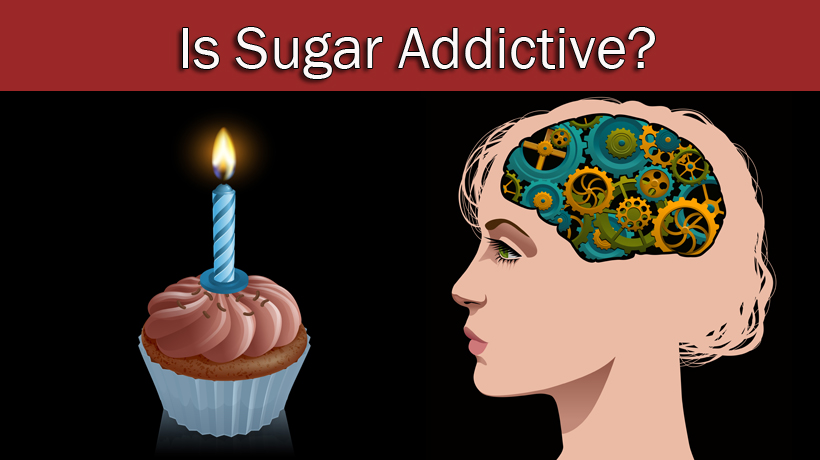Dieticians tell people looking to lose weight to log their food in a journal and track their calories and nutrient intake. Oftentimes, the people on a diet dutifully track the portion sizes and the types of foods they’ve prepared in their meals, but not the two small cookies they had while waiting for dinner to cook. Or the donut they had at work. Or the extra sugar in their latte.
For people with an insatiable sweet tooth, cutting sugar cold turkey seems impossible. According to research, your body may be enabling your unstoppable cravings for sugary treats. But does that mean your urge for sweets is the same as a drug addiction?
What’s happening when your body craves sugar
People on a diet might crave sugary foods more than usual because they aren’t eating enough, according to the Ohio-based Cleveland Clinic. If you haven’t consumed enough fuel in the morning and afternoon, sometimes your body will crave unhealthy foods like sweets because it’s looking for a quick burst of energy. Foods with whole grains and fibers take longer to process the energy.
But for people who have an otherwise balanced diet, indulging in sweet treats can feel like a habit they can’t shake. Research shows that consuming sugar mimics the high that cocaine produces in the body. For example, a 2013 study from France says, “At the neurobiological level, the neural substrates of sugar and sweet reward appear to be more robust than those of cocaine.”
In a study published in the journal Neuroscience and Biobehavioral Reviews, researchers from Princeton University studied how eating sugar releases dopamine, the “feel-good” hormone. This may explain why eating a pint of ice cream after a breakup feels so therapeutic –– and why you want to go back for second and third portions of birthday cake.
What we mean by “addiction”
What is an “addiction?” According to the American Psychiatric Association (APA), addicts have an intense focus on a substance to the point that it interrupts the way they perform daily tasks or interact socially. They continue to feel dependent on the substance, even knowing the risk it may take on their body.
That may sound familiar for people who can’t go a day without a chocolate bar.
The APA says changes in the brain’s wiring are what cause addicts to have cravings for their drug of choice, making it harder to stop using the drug once they’ve become addicted. However, some researchers say the brain reacts to sugar consumption but isn’t necessarily altered. The Sugar Research Advisory Service (SRAS), which is based in Australia and New Zealand and shares the latest research on sugar, says there’s no evidence that increased sugar consumption doesn’t have the increasing potency of addiction the way that other drug addiction does. However, they do say the research available on sugar consumption is much more limited than the available evidence of drug addiction.
So is sugar as addictive as cocaine?
That depends on your definition of “addiction.” The SRAS says that “addictive-like consumption of sugar is different to drug addiction in both neurobiology and behavior.” The physiological dependency on sugar isn’t the same as cocaine.
That doesn’t mean it doesn’t have addictive properties. The 2013 French study says that the feel-good sensation from eating sugar is “even more rewarding and attractive” than the effects of cocaine. And for people who seek those extra rewards, such as stressed or depressed people, a pan of brownies can feel just as addictive.
There may still be hope for those who can’t seem to cut sugar. Making small changes, like replacing soda with flavored water or eating a balanced meal, might cut cravings. Meanwhile, for those who binge on sweets or depend on them for stress relief, addressing their mental health issues could help. Finding help for stress, depression, anxiety, or grief may be the true culprit of addictive behavior.
Sources:
https://health.clevelandclinic.org/3-reasons-you-crave-sweet-or-salty-foods/
https://www.ncbi.nlm.nih.gov/pubmed/23719144
https://www.ncbi.nlm.nih.gov/pubmed/17617461
https://www.psychiatry.org/patients-families/addiction/what-is-addiction
https://www.srasanz.org/sras/news-media-faq/sras-articles/sugar-and-addiction-a-review-evidence/
https://www.ncbi.nlm.nih.gov/pmc/articles/PMC5174153/
https://www.healthline.com/health/food-nutrition/experts-is-sugar-addictive-drug#3
https://www.healthline.com/health/sugar-detox-symptoms#Beating-the-side-effects



